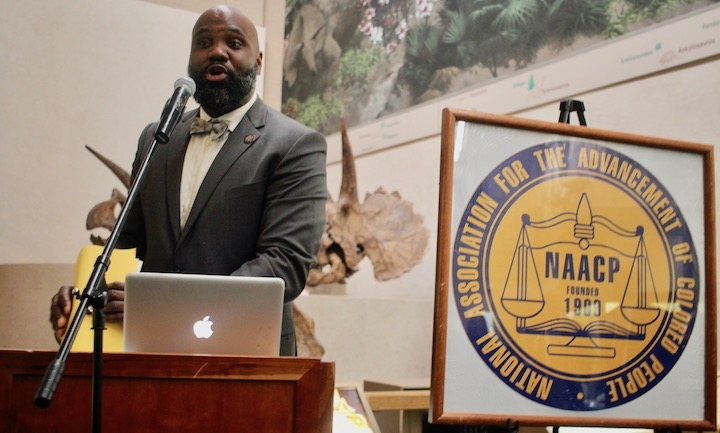
Canton revisits chapter history at Wednesday’s celebration.
Greater New Haven’s NAACP formed in 1917 less than a decade after the national civil rights organization debuted, a recognition of local abolitionists and activists involved in the fight against race hatred and racial discrimination.
One hundred years later, the fight continues.

HANH Executive Director Karen DuBois- Walton and Sharon Jones at the silent auction.
The chapter celebrated those 100 years of work Wednesday evening at the Peabody Museum with a reception and silent auction fundraising event.
It was a bittersweet celebration for an organization that has sought to eradicate racial inequality and finds that so many years later that the goal hasn’t been completely achieved yet. By some estimates it might still be as elusive as ever.

Dumas: Fight for equal justice and fair treatment continues.
Branch President Dori Dumas told the crowd gathered at the museum that the primary focus of the Greater New Haven chapter, as with the national organization, has always been to protect civil rights, and to seek equality, justice and fair treatment for all.
“We continue to fight and we will not let anyone turn back the clock,” she said.
Dumas said that means being positioned with “time, talent and money” to fight for justice and find solutions to problems that impact communities of color. The local NAACP chapter has dedicated thousands of hours to expand access to health care, economic opportunity, homeownership, education and voting rights.

Harp: The need is as great in 2017 as it was in 1917.
Mayor Toni Harp alluded to efforts to turn back the clock under the country’s new leader, President Donald Trump.
“We certainly can’t afford any steps backward,” she said.

Centennial Committee members at Wednesday’s celebration.

Centennial Committee Chair Nicole Murphy with Jennifer Wells-Jackson, and Karimah Mickens-Webber
David Canton, Connecticut College associate professor of history and director of Africana Studies, introduced the crowd to George Crawford. He hailed from Tuscaloosa, Ala. and was a product of two historically black institutions, Tuskeegee Institute and Talledga College.

The Rev. Bonita Grubbs and Will Ginsberg.
Crawford would go on to graduate from Yale Law School and become a founding member of the Greater New Haven Chapter of the NAACP. He served as New Haven’s first African-American corporation counsel.

Former branch President Jim Rawlings and YNHH Director of Nursing Ena Williams.
In the course of the chapter’s founding, it would get a visit from a prominent member of the NAACP, James Weldon Johnson, who at the time served as field secretary and was responsible for opening new branches of the organization.
Canton said soon those interested in the history of the chapter will be able to find and expanded version on the chapter’s website.
There also was time to look forward Wednesday evening to new partnerships, particularly with Key Bank, which sponsored the silent auction.
David Cantor, business banking sales leader for Key Bank in New Haven, Hartford, and Western, Massachusetts, praised the organization for its commitment to helping communities prosper while advancing the fight for basic human rights in the region for the last 100 years.